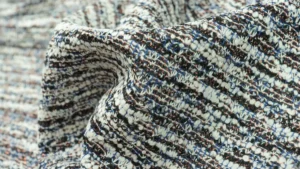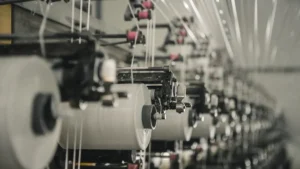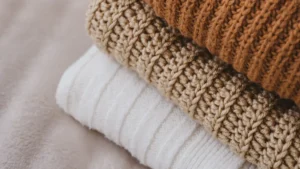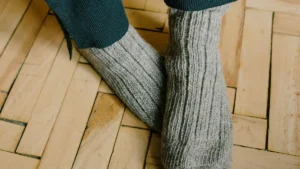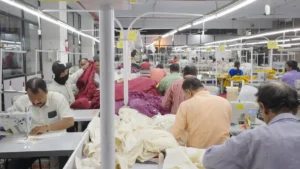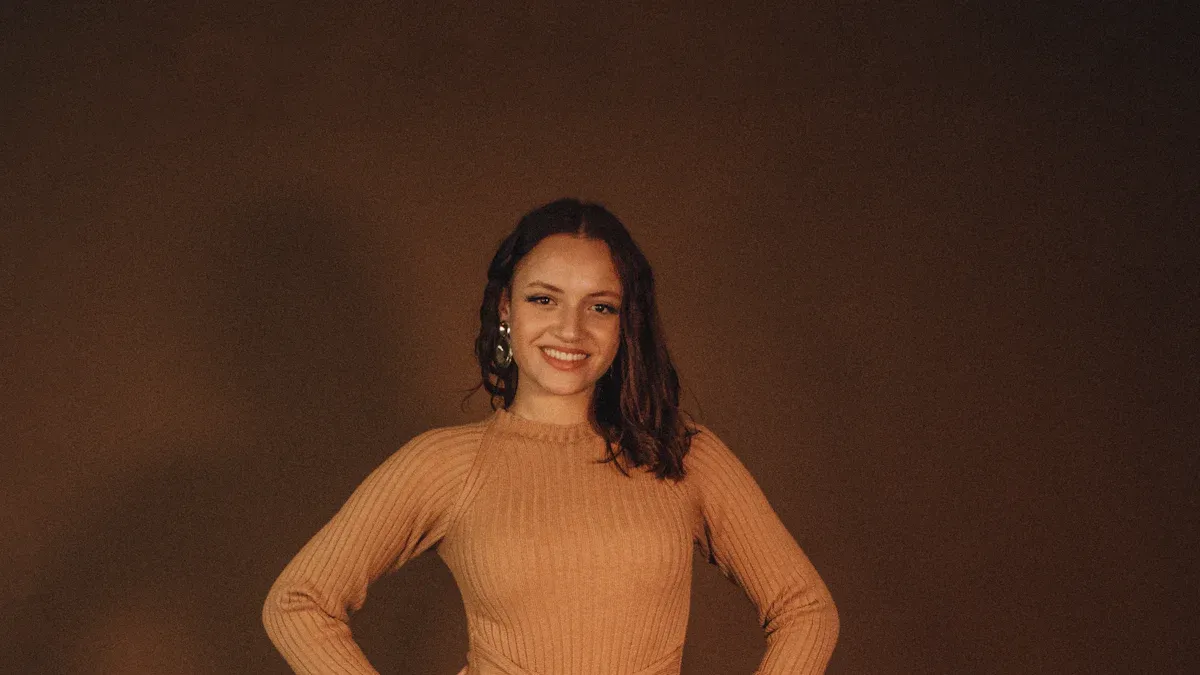
You can see the Rib Knit Dress Trend in many places, like boutique windows and big stores. This style is easy to notice because rib knit fabric feels soft on your skin. It also stretches, so it fits well and feels comfy. Many buyers pick these dresses because they are useful for many things. You can wear a rib knit dress any time of year. It works for both casual days and fancy events. The fabric feels cozy and can change shape, so shoppers really like it.
Key Takeaways
Rib knit dresses are soft and stretchy. They fit well on many people. You can wear them in any season or for any event. There are many styles like sleeveless, bodycon, and sweater dresses. These styles help meet what different customers want. Pick rib knit fabric that is high quality. It should stretch well and have strong stitches. This makes the dress last longer and feel good. Work with suppliers you can trust. They should have certifications and offer custom options. They should also talk clearly with you. Use eco-friendly fabrics and certifications. This helps meet the need for more sustainable fashion.
Rib Knit Dress Trend Overview
Fabric Features
You can recognize the Rib Knit Dress Trend by its unique fabric structure. Rib knit fabric uses alternating knit and purl stitches, which create vertical ridges. These ribs give the fabric a soft, stretchy feel that hugs your body and moves with you. The stretch goes side to side, so the dress keeps its shape even after many wears. You will notice that rib knits come in different textures. Some have fine, delicate ribs, while others show bold, chunky lines. This variety lets you choose a style that fits your brand’s needs.
Here is a quick look at common rib patterns and their features:
Rib Pattern | Structural Features | Performance Characteristics |
|---|---|---|
1×1 Rib | One knit, one purl; fine ribs | High stretch, reversible, great for cuffs and collars |
2×2 Rib | Two knit, two purl; chunkier ribs | Balanced stretch and texture, holds shape well |
4×4 Rib | Four knit, four purl; wide ribs | Strong support, bold texture, less drape |
Rib knit fabric also resists edge curling, so your dresses keep crisp lines. The fabric traps air, which adds warmth in cooler months. You can use rib knit for both fitted and relaxed dress styles, making it a versatile choice for your collection.
Consumer Appeal
The Rib Knit Dress Trend started gaining attention in 2021. You saw celebrities like Kendall Jenner wear rib knit dresses on social media, making them a must-have for summer. Since then, the trend has grown stronger. You can find rib knit dresses in many styles, from cutout and maxi dresses to classic bodycon shapes. These dresses fit many occasions, whether your customers want something casual or a piece for a night out.
You will notice that rib knit dresses appear on runways and in fashion magazines. Designers use details like flare sleeves, front zips, and draping to add style and volume. The trend fits with popular looks such as ‘coastal grandmother’ and ‘off-duty model,’ which focus on comfort and timeless basics. Social media platforms like TikTok and Instagram show people styling rib knit dresses with sneakers or heels, proving their versatility.
Note: The Rib Knit Dress Trend stays popular because it combines comfort, style, and adaptability. You can offer your customers a dress that feels good and looks modern, meeting the demand for both fashion and function.
Style Variations
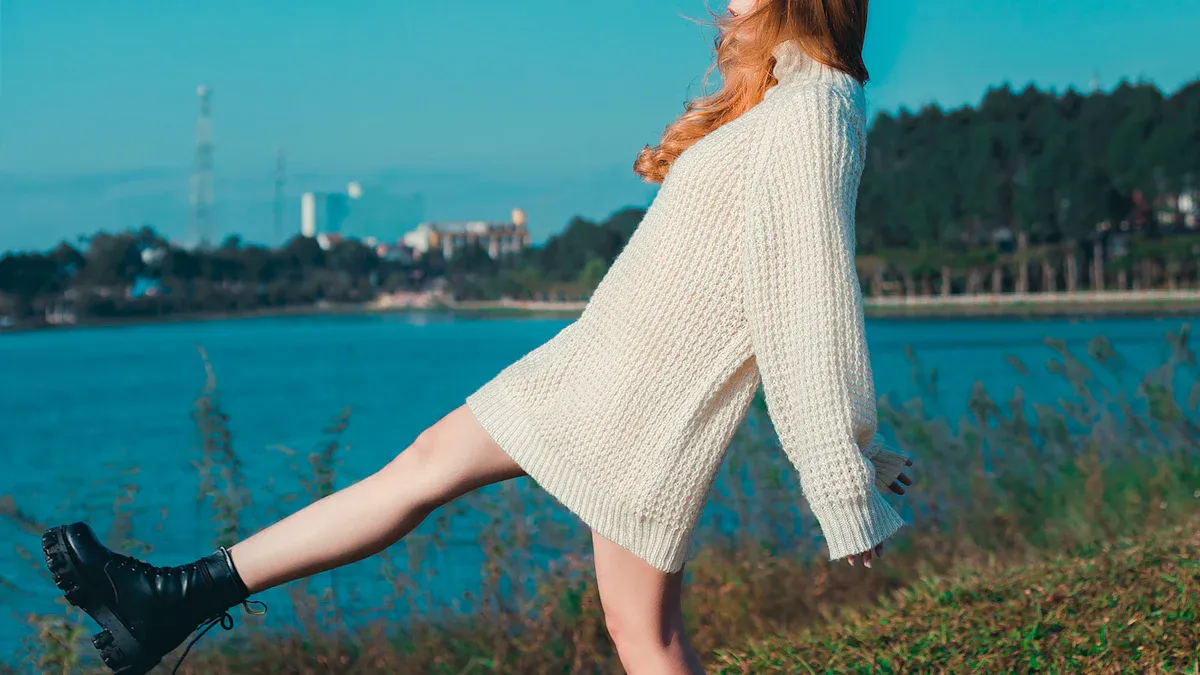
Dress Types
You can find rib knit dresses in many shapes and styles. Each type offers a unique look and feel for your customers. Here are some of the most popular options:
Sleeveless Dresses: These styles work well for warm weather or layering. You can pair them with jackets or cardigans for a fresh look.
Long Sleeve Dresses: These dresses provide extra coverage and warmth. Many shoppers choose them for fall and winter collections.
Bodycon Dresses: The fitted shape hugs the body and highlights natural curves. This style remains a top seller because it flatters many body types.
Shift Dresses: These dresses have a relaxed fit and straight lines. They offer comfort and suit casual or work settings.
Vintage-Inspired Dresses: You can spot these styles by their retro details, such as point collars or button fronts. They appeal to shoppers who love classic fashion.
Sweater Dresses: These rib knit sweater dresses use thicker yarns for a cozy feel. They work well for cold months and can be styled with boots or tights.
Maxi Dresses: The rib knit maxi dress gives a long, elegant look. It can be dressed up or down for different occasions.
Tip: Stocking a mix of these dress types helps you reach a wider audience and meet different style needs.
Design Details
Design details set each rib knit dress apart. You can choose from a range of necklines, sleeves, and lengths to create a standout collection. Best-selling dresses often feature fitted, sleeveless bodycon shapes, scoop backs, and long sleeves with slit options. These elements add both comfort and style.
Here is a table showing the most common design details:
Design Detail | Variations and Frequency |
|---|---|
Necklines | V-neck (most frequent), Crew neck, Scoop neck, Point collar, Polo collar, Turtleneck |
Sleeves | Long sleeves (most frequent), Sleeveless, Short sleeves |
You can also find ribbed knit dresses with side slits, button accents, or cutout features. Printed rib knits add another layer of interest, letting you offer bold patterns or subtle textures. Lengths range from mini to midi and maxi, so you can match the dress to the season or occasion.
Popular Features:
Fitted silhouettes
Scoop backs
Long sleeves with slits
Note: Mixing these design details helps you create a collection that feels fresh and on-trend.
Seasonal Options
Rib knit dresses adapt easily to every season. In early spring, you can layer a rib-knit dress with a sweater or jacket and wear it with sneakers. This makes it a smart choice when the weather changes. During summer, sleeveless or short-sleeve styles keep your customers cool. For fall and winter, ribbed knit sweater dresses and long sleeve options provide warmth and comfort.
The rib knit dress trend stands out because it fits many occasions. Your customers can wear a ribbed knit midi dress to work with flats or dress it up for evening events with heels. The soft, stretchy fabric and timeless shapes make these dresses a year-round staple. You can offer styles that work for both day and night, giving shoppers more ways to wear them.
Pro Tip: Choose rib knit dresses in neutral colors for year-round appeal, and add seasonal prints or bold hues for special drops.
Sourcing High-Quality Rib Knit Dresses
Fabric Quality
When you look for rib knit dresses, start with fabric quality. Good rib knit fabric feels soft and stretches well. It should keep its shape after many wears. Look for tight, even stitches and a fabric that feels thick. If the dress bounces back after you stretch it, it will not sag later.
Here are some ways to check fabric quality:
Check for ISO 9001 certification. This means the maker follows strict rules.
Ask if the supplier uses AATCC tests. These tests check color, shrinking, and pilling.
Make sure the dresses pass CPSIA safety rules. This includes fire tests and checks for bad chemicals.
Ask for lab tests from another company. This gives you a fair view of the fabric.
Touch the fabric yourself. Feel if it is soft, check the texture, and stretch it to see if it goes back to normal.
Read the labels and specs. Make sure they are clear and last a long time.
Think about what the fabric is made of. The table below shows common rib knit materials and how they work:
Fabric Composition | Key Properties | Impact on Performance |
|---|---|---|
Cotton Rib Knit | Soft, breathable, good stretch and recovery, easy care | Comfort, breathability, shape retention |
Polyester Rib Knit | Durable, wrinkle-resistant, moisture-wicking | Durability, moisture management, snug fit |
Rayon Rib Knit | Lightweight, silky, good stretch and recovery | Drape, flow, may shrink if not pre-washed |
Warm, cozy, moisture-wicking, temperature-regulating | Ideal for cold weather, shape retention, comfort | |
Bamboo Rib Knit | Eco-friendly, soft, hypoallergenic, antibacterial | Good for sensitive skin, keeps fabric fresh and odor-free |
You can ask for fabric samples before you buy a lot. This helps you check the feel, color, and stretch in person. Always pick rib knit fabrics that fit your brand’s needs for comfort, strength, and style.
Supplier Selection
Picking the right supplier for rib knit dresses is very important. You want someone who gives good quality, ships on time, and helps your business.
Here are things to think about:
Fabric Quality: Touch samples and check the fabric specs.
Environmental Impact: Ask for reports and green certificates.
Social Responsibility: Look for audits to make sure workers are treated well.
Technology: Visit factories or ask about new machines and AI checks.
Certifications: Ask to see ISO 9001, ISO 14001, Oeko-Tex, GOTS, and BSCI papers.
Customization Options: Make sure you can change colors, sizes, and logos.
Lead Times: Ask how long it takes to make and ship dresses.
Communication: See how fast and clear the supplier answers you.
Factor Category | Key Considerations | How to Verify or Check |
|---|---|---|
Fabric Quality | Softness, durability, color | Touch samples, review fabric specifications |
Environmental Impact | Low emissions, safe chemicals | Request environmental reports, certifications |
Social Responsibility | Good working conditions | Third-party social audits |
Technology | Modern machines, AI inspection | Factory tours, inquire about technology used |
Certifications | ISO 9001, ISO 14001, Oeko-Tex, GOTS, BSCI | Ask to see real certificates |
Customization | Colors, sizes, logos | Confirm with supplier, check sample products |
Lead Times | 2-8 weeks typical, faster with 3D knitting | Ask about lead times, check shipping history |
Communication | Clear, responsive | Evaluate during inquiry and sample ordering |
Check the minimum order amounts and how long it takes to get your order. Some suppliers, like Stylewise Direct, let you order any amount. This is good if you want to try new styles or keep less stock. Others, like Darwin Clothing Factory, want you to order at least 100 pieces. Samples usually take 1 to 2 weeks. Full orders can take 2 to 8 weeks, depending on the dress.
Tip: Always check order amounts and times before you buy. This helps you plan and avoid waiting too long.
Customization
Customization helps you make rib knit dresses that are special. Many top makers let you pick from lots of options to match your brand.
You can choose:
Full-color digital printing on rib knit fabrics.
Custom images, repeat patterns, and special colors.
Different fabric types, like Lycra, jersey, fleece, and more.
Hemming choices, such as black or white thread, or neat cutting.
Eco-friendly printing with water-based inks.
No minimum order for small runs or samples.
Fast making and shipping, often in 1-2 days.
Some suppliers, like Hongyu Apparel, help you design new styles and finish them fast. You can work with their team to make new looks, pick special finishes, or add cool details to your ribbed knit midi dress or rib knit sweater dress.
Pro Tip: Use customization to sell special rib knit maxi dresses or ribbed knit sweater dresses with unique prints. This can make your brand more exciting and bring in new shoppers.
If you focus on fabric quality, good suppliers, and fun customization, you can get rib knit dresses that are high quality and make your customers happy.
Sustainability in Sourcing
Eco-Friendly Fabrics
You can help your rib knit dress line stand out by picking eco-friendly fabrics. Many brands use materials that are better for the planet. This meets what shoppers want in green fashion. When you choose sustainable fabrics, you show buyers you care about the earth and the future.
Here is a table with some popular eco-friendly fabrics for rib-knit dresses and their benefits:
Fabric | Sustainability Features | Environmental Benefits |
|---|---|---|
Organic Cotton | Grown without chemicals; certified by GOTS and OEKO-TEX; uses less water | Healthier soil, less pollution |
Tencel Lyocell | Made from wood; closed-loop process saves water and reuses solvents | Biodegradable, soft, moisture-wicking |
Hemp | Grows fast, needs little water, no pesticides | Durable, enriches soil, low impact |
Recycled Polyester | Made from recycled bottles; cuts carbon emissions and waste | Reduces plastic pollution, lowers carbon footprint |
Pineapple Leaf Fiber | Uses farm waste; no extra land, water, or chemicals needed | Biodegradable, reduces waste, leather alternative |
You can also try new fibers like Naia™ cellulose yarn and REPREVE® recycled fiber. These choices help you make less waste. They let you offer ribbed knit dresses that look good and are better for the planet.
🌱 Tip: Using eco-friendly fabrics for your ribbed knit midi dress or rib knit sweater dress can bring in shoppers who want to help the earth.
Certifications
You should always check for certifications when you buy rib knit maxi dress or rib knit sweater dress styles. Certifications prove your supplier uses safe, fair, and green ways to make clothes. They also show your ribbed knit dress meets world rules for being green and fair to workers.
Look for these important certifications:
Better Cotton Initiative (BCI): Saves water and keeps soil healthy in cotton farms.
Bluesign: Checks for safe and green ways to make fabric.
Cradle to Cradle (C2C): Focuses on safe products, recycling, and clean energy.
Global Recycle Standard (GRS): Checks recycled content and good processing.
WRAP and SA8000: Make sure workers are treated fairly and work safely.
GOTS and OCS: Prove organic materials and green production.
Fair Trade Certified and Fair Wear Foundation: Support fair pay and good working conditions.
Note: Certifications and honest suppliers help you earn trust from customers and meet the need for more sustainable rib knit dresses.
Recent market data shows more shoppers want eco-friendly rib knit dress choices. You can see this in the rise of organic cotton, recycled polyester, and other green materials. As more buyers want ribbed knit dresses made from natural or recycled fibers, you can grow your business by offering these options.
Merchandising Strategies
Visual Merchandising
You can boost sales of rib knit dresses by focusing on strong visual merchandising. Start with eye-catching window displays or homepage banners. These displays draw shoppers in and make your rib knit dress collection stand out. Place your best-selling ribbed knit midi dress or rib knit sweater dress at the front of your store or at the top of your website. This helps customers find them quickly.
Use high-quality images and clear, detailed descriptions. Show close-ups of the ribbed texture so shoppers can see the fabric’s unique look. Good lighting and simple backgrounds help the rib knit maxi dress or rib knit sweater dress shine. In-store, group rib-knit dresses by color or style. This makes it easy for customers to compare options and pick their favorites.
Tip: Use outfit bundles or mannequins to show complete looks. This inspires shoppers and encourages them to buy more items.
You can also use digital tools. Personalized recommendations and AI styling features help customers see how a rib knit dress fits or can be styled. At checkout, suggest related items like belts or cardigans to increase basket size.
Styling Ideas
You can help customers imagine new ways to wear a ribbed knit dress. Offer styling tips in-store and online. For example, show how to layer a ribbed knit midi dress with a denim jacket for a casual look. Suggest pairing a rib knit sweater dress with boots and a scarf for fall.
Create capsule wardrobe ideas. Show how a rib knit maxi dress works for both day and night. List items that pair well with ribbed knit dresses, such as sneakers, heels, or statement jewelry.
Cross-sell with:
Lightweight cardigans
Chunky boots
Statement belts
Layered necklaces
Note: The ribbed texture adds depth and interest to any outfit. You can use this to create displays that feel modern and fresh. This approach helps your rib knit dress collection appeal to a wide range of shoppers.
Color and Print Trends
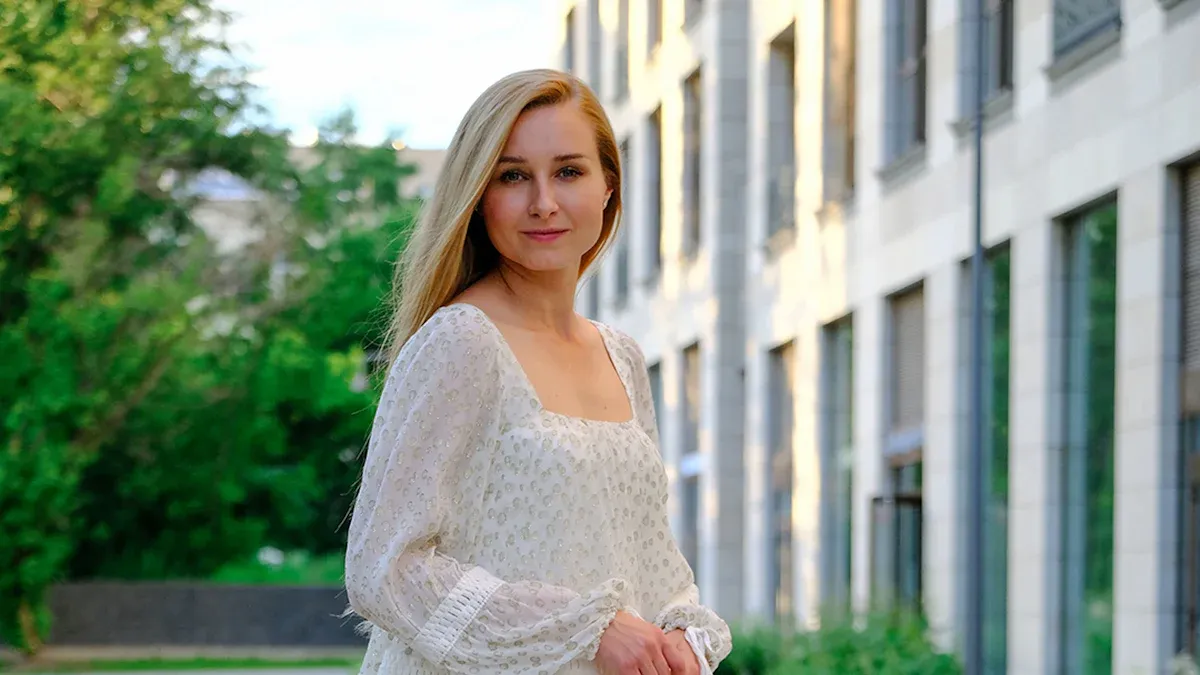
Core Colors
You will notice that black stands out as the top-selling color for rib knit dresses in major markets. Brands like GANT offer their rib knit strap dress in black across Europe, Asia, North America, and Africa. Black works well because it looks classic and fits many occasions. You can style a black rib knit dress for work, casual days, or evening events. This color also flatters many body types and pairs easily with accessories.
When you plan your collection, always include black as a core color. It gives your customers a safe and stylish choice. You can also add other neutrals like gray, beige, or navy to create a strong foundation. These shades help you build a versatile rib-knit dress lineup that appeals to a wide audience.
Tip: Stocking core colors like black ensures steady sales and repeat purchases. Customers often return for classic shades that never go out of style.
Seasonal Prints
Prints and new textures bring fresh energy to your ribbed knit dress collection. For 2025, you will see several print trends shaping buyer choices:
Polka Dots: This retro print returns for summer. Polka dots feel playful and timeless. They remind shoppers of early 2000s romantic comedies. You can style a polka dot rib knit dress with ballet flats and a mini bag for a flirty look.
Florals and Pastels: Soft floral prints and pastel colors like buttercup yellow, sky blue, and blush pink lead spring and summer trends. These prints create a dreamy, feminine vibe. Pair a floral ribbed knit midi dress with a cardigan or butterfly clips for a nostalgic touch.
Nautical Stripes: Stripes inspired by maritime fashion make a comeback. Nautical stripes give your rib knit sweater dress or rib knit maxi dress a resort feel. You can style these with oversized knits for a relaxed, statement look.
You should plan seasonal drops and limited editions around these trends. Offer small runs of printed rib knit dresses to test new styles. This approach keeps your collection fresh and encourages customers to shop for the latest looks.
Note: Mixing core colors with trending prints helps you meet demand for both timeless and fashion-forward rib knit dresses.
Fit and Construction
Stitch Density
Stitch density plays a key role in the quality of a rib knit dress. You measure stitch density by counting the number of stitches in a set length. A higher stitch density means more stitches per centimeter. This makes the seams stronger and the dress more durable. When you choose a rib-knit dress with high stitch density, you get a garment that resists seam failure and lasts longer.
Low stitch density (3-5 stitches/cm) gives a smooth look but works best for light use.
Medium stitch density (6-8 stitches/cm) balances strength and appearance, making it good for everyday wear.
High stitch density (9-12 stitches/cm) offers the best durability and seam strength. This level stands up to frequent washing and wearing.
A ribbed knit dress with higher stitch density keeps its shape and looks new longer. This boosts customer satisfaction because the dress stays comfortable and stylish over time.
Tip: When you source rib knit sweater dresses or ribbed knit midi dresses, always check the stitch density to ensure long-lasting quality.
Yarn Choices
The yarn you select for a rib knit dress affects how it feels, fits, and lasts. Rib knit fabrics use a mix of knit and purl stitches, which creates vertical ribs. This structure gives the fabric its famous stretch and shape retention. You want a ribbed knit dress that moves with the body and returns to its original shape after stretching.
Characteristics & Impact on Fit and Comfort | |
|---|---|
Cotton | Soft and breathable. Feels good for daily wear. May lose shape unless blended with spandex. |
Cotton-Spandex | Adds stretch and helps the dress keep its shape. Great for fitted rib knit maxi dresses. |
Polyester Blends | Durable and wrinkle-resistant. Keeps its shape and works well for active or casual rib knit dresses. |
Wool | Warm and moisture-wicking. Perfect for rib knit sweater dresses in cold weather. |
Rayon | Soft with a nice drape. Lets the dress flow and move with you. |
Bamboo | Very soft and moisture-wicking. Stays comfortable and keeps its fit, even after many wears. |
Rib knit fabrics with spandex or elastane offer excellent stretch recovery. This means your ribbed knit dress will not sag or lose its shape, even after many washes. The fabric’s elasticity and resilience make it ideal for one-size-fits-all designs. These dresses flatter many body types because the fabric stretches and recovers in all directions. You can trust that a rib knit sweater dress or rib knit maxi dress will fit comfortably and look great on a wide range of customers.
Note: Choosing the right yarn and stitch density ensures your rib knit dress collection stands out for comfort, fit, and durability.
The Rib Knit Dress Trend is still popular because people want clothes that feel good, look nice, and can be worn in many ways. Buyers get help from new fabrics, green choices, and online tools that make finding good rib knit dresses simple. Pick strong fabrics, earth-friendly materials, and styles your customers like. Watch for new trends and plan your stock carefully. If you use these ideas, your dresses will be special and more people will want to buy them.
FAQ
What makes a rib knit dress different from other knit dresses?
A rib knit dress uses vertical ridges that give the fabric extra stretch and shape retention. You get a fit that hugs your body and feels comfortable all day. This style stands out from flat or jersey knits.
How do you care for a ribbed knit dress?
You should wash your ribbed knit dress in cold water on a gentle cycle. Lay it flat to dry. This keeps the shape and prevents stretching. Always check the care label for special instructions.
Can you wear a rib knit sweater dress in warm weather?
Yes, you can wear a rib knit sweater dress in spring or cool summer nights. Choose lighter yarns and sleeveless or short-sleeve styles. Pair your dress with sandals or sneakers for a fresh look.
What styles work best for a rib knit maxi dress?
You can find rib knit maxi dresses in fitted, A-line, or wrap styles. These shapes flatter many body types. Add a belt or layer with a jacket for extra style. This dress works for both casual and formal events.



